It can be tough to get motivated again after the Christmas break, but to kick off 2022 I’d like to share some of my study tips on staying organised with upcoming deadlines. First of all, I really like the app ‘My Duty’. I’ve been using it since before I went to university and it works as a calendar app so you can see upcoming appointments and duties. You can choose up to 10 ‘duties’ and name them all, colour-coded. Then you can display the entire month and see what duties you have each day, including times they start and finish. For example, when I was on my student placement, I’d have set days highlighted with ‘Placement’, ‘Study Days’, ‘University’, and days around my weekend jobs too outlining which job it was. This helped me see a snapshot of my month and what I might be doing, including adding alarms and events to each day.
I also love my planners that I’ve found super helpful as a student! I spend my Sundays filling out ‘The Weekly Balance’ pad which gives me a box to fill in for each day of the week, bullet points around ‘Life’ and ‘Work’. I love this aspect as it helps me to separate work related appointments and jobs, including study work related ones, from life commitme
nts, like scheduled coffee dates with friends or hair dresser appointments! The ‘Daily Balance’ is also one of my favourites, and I use it when I have a particularly busy day or want to keep myself on track. I find if each hour in my day has something highlighted to do, I’ll procrastinate less and spend my time more wisely. It also helps me to focus on the split between work/study and life, to keep a healthy balance throughout my days. On the right it has a checklist for what I need to complete and a ‘priorities’ section so I can visually tick off what I’ve completed. For me, being able to tick off items helps me to feel more accomplished and reflect upon what I have achieved, even if I didn’t feel as if I managed much that day, having it in front of you can really help to remember even the small tasks you completed! I love how it focuses too on a few tasks to overrun onto ‘tomorrow’ and my meals of the day.
This brings me onto being sure you plan regular refreshment breaks throughout your busy day, particularly if you’re studying! Brain power needs fuel, therefore eating healthy small meals throughout your day and remembering to stay hydrated is particularly important and is a gentle reminder to eat and refill your body with what it needs to stay focused.
My daily balance pad also only goes as late as 10pm and starts from 6am. This might not work for you, particularly if you focus better late at night, but with meetings and life commitments during the day, often I find I can’t be up all night anyway! Therefore, it reminds me to switch off by 10pm, or earlier should you wish, and aim for 8 hours of sleep a night. Getting enough sleep allows me to not feel overwhelmed with deadlines upcoming and feel refreshed to start my day studying again in the morning.
I like to make my planners as colourful and creative as possible so that I enjoy looking at them. I use a lot of colour to highlight the urgent commitments so I can focus on those first, particularly the less enjoyable assignments or revision topics.
I have also found that setting myself smaller goals and deadlines before the main deadline particularly helps. For example, my course often involves essays of around 3000 words, usually set with 5–7-week deadlines. I’d find myself breaking this down in my diary, with ‘plan’, ‘1000’ word deadlines and ‘first draft’ deadlines set weekly so I could focus on a small part at a time. I also found this takes the pressure off having to start at the beginning, so I could write 1000 words of the middle of the assignment first, feeling accomplished, if I was struggling with the introduction of the assignment.
For me, it’s all focused on routine. If you can spend just an hour a week before the week begins, to focus on the tasks you need to priorities, highlight the urgent ones, and fill in gaps to enable fresh air breaks, hydration breaks and snack breaks, then I find I spend less time procrastinating and more time being productive. Be sure to factor in some down time too during your day, however that looks to you! It might be a walk-in nature, going for a swim, watching your favourite show on Netflix, ringing your best friend for a long chat, cooking/baking, doing a 15-minute headspace meditation in between study sessions to clear your mind, or taking a long-soaked bath with your favourite spa items. Staying focused and being productive is all about balance, so make sure you schedule in some well needed rest time! I hope this helps give you some ideas around how to plan a productive study day, staying focused and breaking down the workload.

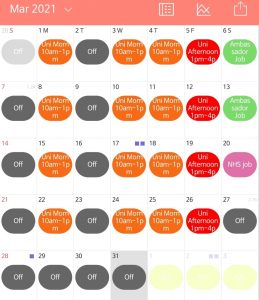
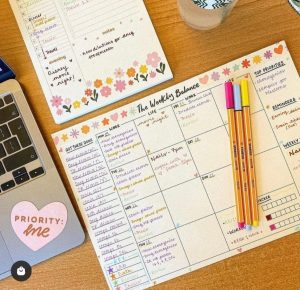
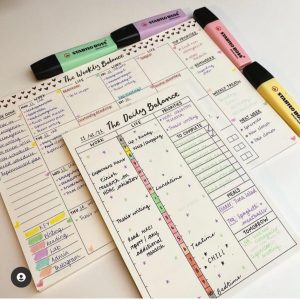
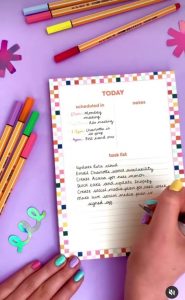


 Balancing it all (part-time work, studies and a social life)
Balancing it all (part-time work, studies and a social life) Study Tips Whilst at Uni
Study Tips Whilst at Uni The lessons I learnt at BU
The lessons I learnt at BU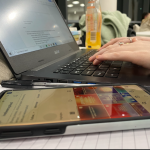 Running the last lap: Tips for final year
Running the last lap: Tips for final year








